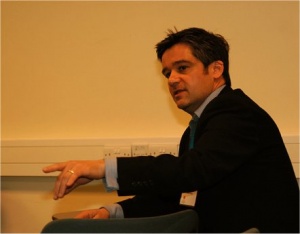Charlie Beckett
Charlie Beckett is the founding director of Polis (since 1 June 2006), a "new journalism and society think-tank" attached to the LSE and the London College of Communications (part of the University of the Arts). He is a former Senior Editor for Channel Four News, and has spent the past 20 years "working for some of the best news and current affairs programmes at the BBC, LWT and ITN." [1]
Views on journalism
Beckett is in favour of the free market and produces arguments on the media with a similar agenda to the wide range of neoliberal commentators such as John Lloyd on how the media are too liberal and are damaging politics. Here is his argument that the mainstream broadcast media in the UK are too liberal, too sympathetic to NGOs and not nearly as fond of pushing extreme market fundamentalism:
- How was the BBC supposed to broadcast acres of Live8 and at the same time give space to the perfectly valid counter-arguments about how aid has failed Africa for the last forty years?
- The same phenomenon is at work at the G8 summit in Heiligendamm, Germany, held on 6-8 June 2007. Greenpeace and other NGO activists were given a privileged space within TV news reports and much of the written press where they are allowed to criticise governments for not doing what the pressure groups want. The spokespeople are a useful way for journalists to add drama to what is otherwise a pretty complicated and boring story. Phrases like "but Greenpeace/Oxfam denounced the initiative as too little too late", allow the reporter to imply some deep divide, some dramatic debate without having to go in to details, let alone analysis or argument.
- It's rare to hear anyone mention that the NGOs are fundraising, unelected sloganeers who simplify their messages to raise profile as much as to raise arguments. Behind the scenes they are working hand-in-glove with the same governments. It is unusual for anyone to ask the NGOs why aid has failed in the past, or whether the market might actually help deliver limits on global warming. And yet journalists feel a kind of moral certitude in giving the NGOs an easy ride, because who can be against giving poor Africa more money or saving the planet? [2]
He raises 'perfectly valid' arguments about aid and the pro market view on climate rather than any other. Unsurprisingly Beckett goes on to name check Tony Blair's, 12 June 2007 'feral beasts' speech, and mention that it was delivered at the Reuters Institute for the Study of Journalism, at which John Lloyd. Perhaps more surprisingly to the uninitiated is that he mentions, his 'former colleague' media academic Roger Silverstone:
- The late Roger Silverstone, my former colleague here at the LSE's media and communication department, was one great theorist of this tendency. His early work, Why Study The Media showed how more reflection about the news media might encourage the public and the press to support more thoughtful journalism and how that would, in turn, encourage a more thoughtful public discourse. In his last work Media and Morality: On The Rise Of The Mediapolis he wrote in quite a visionary vein about how complex threats like global warming and international conflict can only be countered by a greater mutual understanding mediated to a large degree by global journalism. [3]
Silverstone was a key progenitor of Polis and his work seems to be infusing into the neoliberal arguments about the media, through figures like Beckett and some of those associated with the Polis project.
Pro-Israel
Beckett is opposed to any civil society initiative censuring Israel for its conduct in the Occupied Territories.[4]
Affiliations
- Polis – founding director [5]
- Member of the Science and the Media Expert Group appointed by DIUS/BIS, 2009-2010[6]
- Trustee Institute of Development Studies
- Trustee of Article 19
- Trustee of the Media Society [7]
Contact
- LSE phone number: 020 7955 7695
- Email: c.h.beckett@lse.ac.uk
- Blog: www.charliebeckett.org
- Twitter: @CharlieBeckett
Notes
- ↑ Charlie Beckett, 'An introduction to Polis', POLIS: Journalism and Society website, accessed 25 March, 2009.
- ↑ Charlie Beckett, 'The media and Africa: doing bad by doing "good"?' The reporting of Africa in much of the media shows how the curse of formula can disable the best intentions Open Democracy, 18 - 06 - 2007.
- ↑ Charlie Beckett, 'The media and Africa: doing bad by doing "good"?' The reporting of Africa in much of the media shows how the curse of formula can disable the best intentions Open Democracy, 18 - 06 - 2007.
- ↑ Charlie Beckett, 'Dear saves NUJ', POLIS: Journalism and Society website, 10 July, 2007. (Accessed 25 March, 2009)
- ↑ 'An introduction to Polis', POLIS: Journalism and Society website, accessed 25 March, 2009.
- ↑ DIUS Science and the Media Expert Group, 2010, retrieved from the Internet Archive of 21 January 2010 on 17 August 2013
- ↑ Professor Charlie Beckett, LSE website, undated, acc 19 August 2013
